| Sie kannten sich alle | |
|---|---|
| Directed by | Richard Groschopp |
Release date | 1958 |
| Country | East Germany |
| Language | German |
Sie kannten sich alle is an East German film. It was released in 1958.
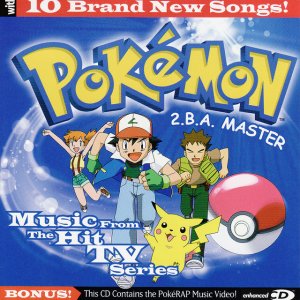
Pokémon 2.B.A. Master is a 1999 album, the first soundtrack album released for the English localization of the Pokémon anime.
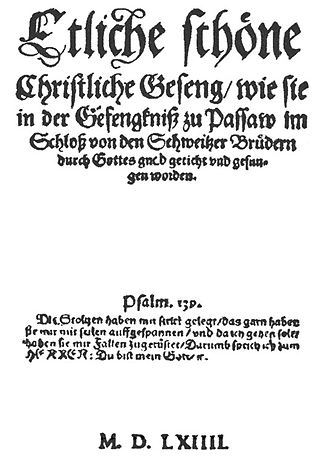
The Ausbund is the oldest Anabaptist hymnal and one of the oldest Christian song books in continuous use. It is used today by North American Amish congregations.

Laith Al-Deen is an Iraqi German language pop musician.
The Buxtehude Bull is an award for youth literature, established in 1971 by Winfried Ziemann, a local book merchant from Buxtehude, a Hanseatic City located in the Hamburg Metropolitan Region. The town council took over the sponsorship of the award in 1981. The award is given annually to the best children's or young-adults' book published in German in the preceding year. The writer is presented with a small steel statue of the bull Ferdinand, from the popular work The Story of Ferdinand by Munro Leaf, and also receives a monetary prize of €5,000.
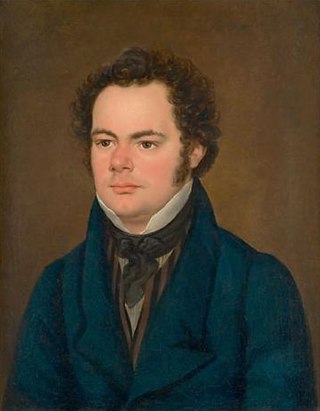
Im Frühling in G major is a Lied by Austrian composer Franz Schubert.

Angelika Overath is a German author and journalist.
Siegfried Weiss was an East German actor.

Sie werden aus Saba alle kommen, BWV 65, is a church cantata by Johann Sebastian Bach. He composed it in 1724 in Leipzig for Epiphany and first performed it on 6 January 1724 as part of his first cantata cycle.
Before the Lightning Strikes is an East German comedy film directed by Richard Groschopp. It was released in 1959.

Waldangelbach is a river of Baden-Württemberg, Germany. It flows into the Leimbach in Wiesloch.

Sonja Sutter was a German film actress. She was one of the few actors that was allowed to appear in productions in both East and West Germany. She is remembered for her role as Fraulein Rottenmeier in the German TV series Heidi from 1978. This series aired in many countries in Europe during the 1980s and 1990s, and was dubbed into several languages. She is also remembered for having had several roles in the TV series Derrick from 1983 to 1998.

Ilse Pagé was a German film and television actress.
The Evangelical-Reformed Church of the Canton of Zürich is a Reformed State Church in Zürich. In 2004 it had 533,000 members and 179 parishes with 900 house fellowships and 520 ordained clergy. Official language is German. It is a member of the Federation of Swiss Protestant Churches. The denomination has Presbyterian-Synodal church government. It is a member of the Conference of Churches on the Rhine. The church traces back its roots to the reformation in Zürich, and Ulrich Zwingli. The reformation came to Zürich in 1519. Among Geneva it became the headquarters of the Swiss Reformation.
Franz Schubert's best-known music for the theatre is his incidental music for Rosamunde. Less successful were his many opera and Singspiel projects. On the other hand, some of his most popular Lieder, like "Gretchen am Spinnrade," were based on texts written for the theatre.
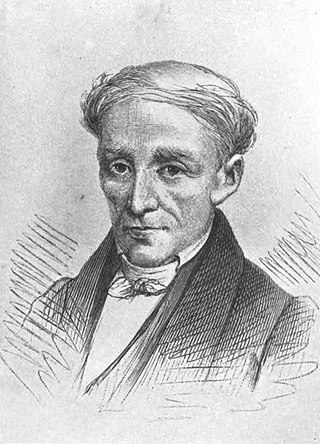
"Weißt du, wie viel Sternlein stehen" is a German lullaby and popular evening song. The lyrics were written by the Protestant pastor and poet Wilhelm Hey (1789–1854), who published them first in 1837. The melody is recorded back to 1818. A poetic English translation of the first and third verse is by Henry William Dulcken (1832–1894).
"Auf, Christen, singt festliche Lieder" is a German Christmas carol. A first text was written in 1778 by August Erthel, which was first published in Fulda with a first melody that year. Heinrich Bone modified the text in 1851 for his hymnal Cantate!. It was sung with different melodies.

Daniela Ludwig is a German politician of the Christian Social Union (CSU) who has been serving as a member of the Bundestag since 2002.
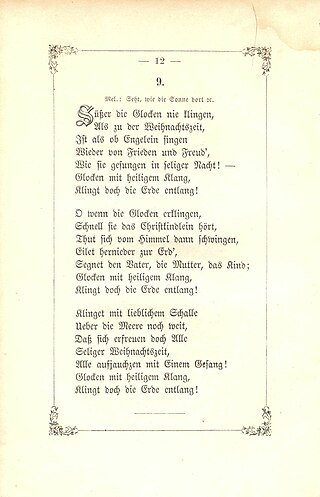
"Süßer die Glocken nie klingen" is a popular German Christmas carol with text by Friedrich Wilhelm Kritzinger to a traditional Volkslied melody, first printed in 1860. It has remained popular and is part of many song books and Christmas recordings, evoking the sound of bells as a symbol of peace and joy.